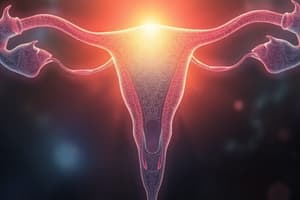Podcast
Questions and Answers
Ehlers Danlos Syndrome is an autosomal recessive disorder.
Ehlers Danlos Syndrome is an autosomal recessive disorder.
False (B)
Which of the following are types of hemostatic disorders?
Which of the following are types of hemostatic disorders?
- Vascular disorders
- Platelet disorders
- Coagulation factor disorders
- All of the above (correct)
What is the main characteristic of Marfan’s Syndrome?
What is the main characteristic of Marfan’s Syndrome?
Abnormal collagen formation leading to skeletal, ocular, and cardiovascular defects.
Hereditary hemorrhagic telangiectasia presents with dilated superficial __________ in the skin.
Hereditary hemorrhagic telangiectasia presents with dilated superficial __________ in the skin.
What are the key features of Ehlers Danlos Syndrome?
What are the key features of Ehlers Danlos Syndrome?
Which condition is characterized by brittle bone disease?
Which condition is characterized by brittle bone disease?
The condition known for bleeding from mucus membranes and into skin is related to __________ disorders.
The condition known for bleeding from mucus membranes and into skin is related to __________ disorders.
Flashcards are hidden until you start studying
Study Notes
Introduction
- Abnormal bleeding can be caused by disorders in the vascular system, platelets, or coagulation factors.
- Vascular disorders can lead to bleeding from mucous membranes and into the skin.
- Platelet disorders can lead to bleeding from mucous membranes and into the skin.
- Coagulation factor disorders can lead to bleeding into joints or soft tissues
Types of Hemorrhage
- Petechiae are very small, pinpoint bleeding spots.
- Purpura are slightly larger bleeding spots.
- Ecchymoses are larger areas of bleeding, also known as bruises.
- Hematomas are large collections of blood that pool in tissues.
Vascular Disorders
- Hereditary Hemorrhagic Telangiectasia is an inherited disorder with dilated capillaries that lead to bleeding.
- Telangiectasia may be pinpoint, nodular, or spiderlike in appearance.
- This disorder appears in childhood and becomes more numerous in adulthood.
- Connective Tissue Disorders are characterized by fragile vascular systems.
- Senile Purpura: This occurs in older age groups due to a decrease in collagen and elastin.
- Scurvy: Caused by vitamin C deficiency, leading to weak blood vessels and bleeding gums.
- Steroid Purpura: Common side effect of steroid therapy.
- Giant Hemangioma: Caused by an abnormal growth of blood vessels.
Hereditary Hemorrhagic Telangiectasia
- An uncommon, autosomal dominant disorder.
- Abnormal blood vessels (Telangiectasia) can appear in the skin and mucous membranes.
Ehlers Danlos Syndrome
- A rare connective tissue disorder with abnormal collagen formation.
- Characterized by:
- Extreme vascular fragility
- Skin hyper-elasticity
- Hyper-extensible joints
Marfan's Syndrome
- An inherited, autosomal dominant disorder associated with abnormal collagen formation.
- Characterized by:
- Skeletal defect (long extremities)
- Ocular defects
- Cardiovascular defects
Osteogenesis Imperfecta
- An autosomal dominant disorder.
- It is a collagen vascular disorder, leading to brittle bones.
- Causes a lack of bone matrix.
- Can be a fatal disease, and those with the condition often die early.
- Leads to a poor quality of life.
Studying That Suits You
Use AI to generate personalized quizzes and flashcards to suit your learning preferences.




